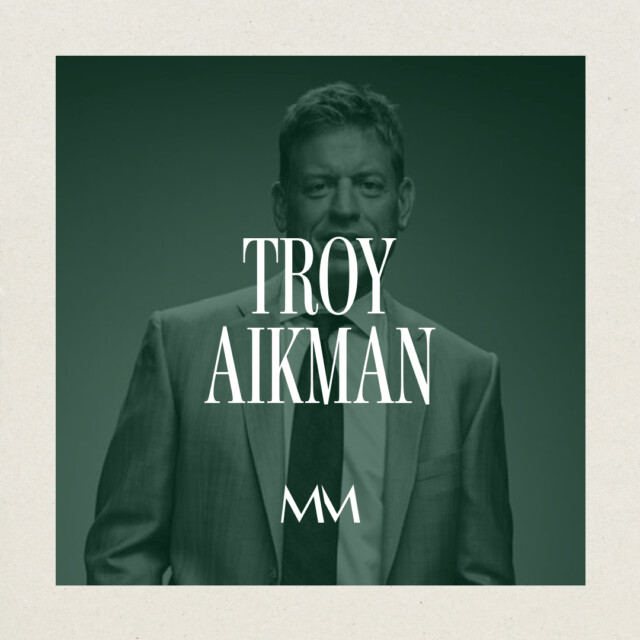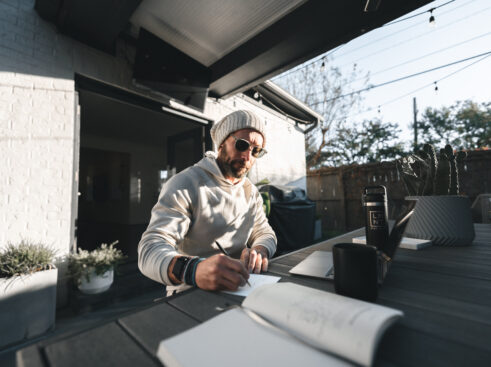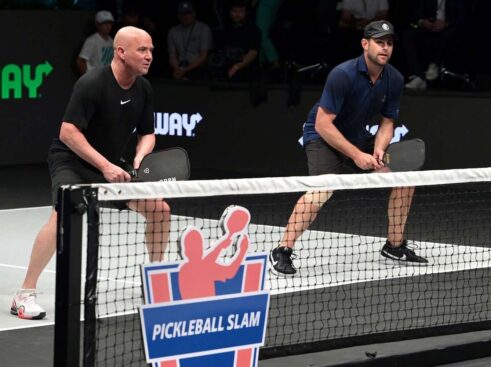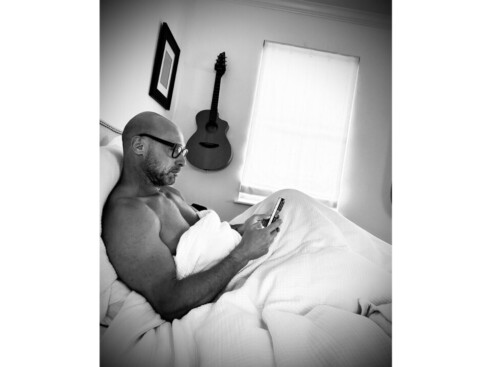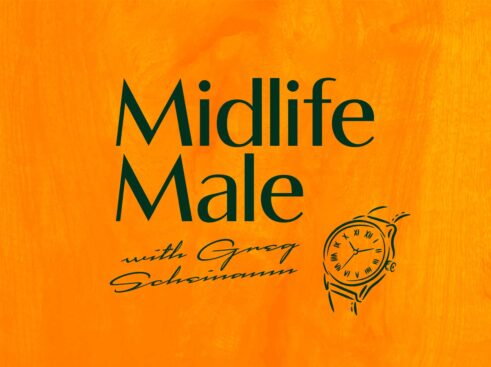Jason Wachob is the Founder and Co-CEO of mindbodygreen and the author of Wellth, a book focused on how to build a life, not just a resume (a core tenet of MLM). He has been featured in the New York Times, Entrepreneur, Fast Company, and Vogue, and has a B.A. in history from Columbia University, where he played varsity basketball for four years. Midlife Male founder Greg Scheinman met Jason through their mutual friend Troy Aikman (featured in MLM Issue #1 here) and they discussed family, fortunes, values, business and more in this week’s How I See It.
How I See It with Jason Wachob
MLM: You are the founder and CEO of a wildly successful business, but you often talk about putting family first. Lots of people “say” that, but how do you put that into practice?
Jason Wachob: Children really do become the center of your world, and you’ll do anything for them. For us, it’s definitely about being kid-centric—putting the kids first.
I try to be an involved dad and go to as many of my kids’ activities as I can. Our seven-year-old is off-the-charts tall and already looks like she’s 10 or 11. It’s a reminder of how quickly time flies. But she still wants hugs and loves being picked up, even though she’s 75 pounds now. I’m strong enough, though—I’ve got the strength, and I can still do it. That’s one of my main motivations for going to the gym. Sure, looking good is nice, but for me, it’s about being able to pick up my kids.
MLM: Where does training and time in the gym fit into your day? Do you knock it out in the morning or get it in when you can?
JW: In the morning, I’m fortunate to live across the street from Anatomy, arguably Miami’s greatest gym—Mark Magnus would say it’s the best gym in the world. A couple of days a week, three or four times, I’ll go across and do a cold plunge, if I’m not driving our kids to school. On the days I do the school run, I skip the plunge. I try to get to the gym three to five times a week. I like to mix it up, but I don’t stay long—I’m a 20-minute guy. I don’t rest much; I go hard and then get out. I could never do those hour-plus workouts. I just go, do my thing, and I’m done.
MLM: What else is important to you to stay on top of your game physically?
JW: Sleep etiquette is very important to me, so I always opt to go to bed earlier rather than later. I have a sleep routine, and I try to eat dinner earlier if I can. I still enjoy alcohol occasionally, but I’ve learned that drinking later in the evening can be problematic for my sleep. I’m better off having a drink at lunch—so says my Oura ring and my WHOOP strap. Sleep is foundational; it all starts with sleep. There’s a great line, I think from Andrew Huberman, that goes, “If you want to know how someone’s doing today, ask how they slept.” That really resonates with me.
MLM: This is a great segue to your company, mindbodygreen. You have a sleep and lifting routine now, but that wasn’t always the case. What made you begin to pay more attention to these things and how did that lead to your business?
JW: This brings me to the founding story of MindbodyGreen. I almost had back surgery due to two extruded discs in my lower back that were pressing on my sciatic nerve. The pain was classic L4, L5, S1 sciatica—excruciating, running down my right leg like a lightning rod. Walking, which brings me so much joy, was taken away from me. I’ve never been into extreme sports or running, but if you want to go on a hike or a power walk, I’m there—I could walk for hours. So, losing that ability was really tough.
I went to see a doctor, had an MRI, and he told me I needed back surgery. I have nothing against back surgery, but the success rates aren’t great, and I view surgery as a last resort. So, I sought a second opinion. That doctor told me the same thing but also mentioned that yoga or therapy might help. I decided to give it a shot. Colleen and I were dating at the time, and she started doing light yoga with me—just five to ten minutes in the morning and evening. Slowly, I started to feel better. The sciatica pain, which had been in my toes, started moving up into my buttocks, a sign that it was improving. Over the course of six months, I completely healed.
During that time, I also began looking into stress, sleep, and nutrition. I was extremely stressed—I was part of another startup, a cookie company that wasn’t doing well. I was flying over 100,000 miles domestically, crammed into a coach seat at six foot seven—it was a complete disaster. My idea of nutrition back then was steak and martinis at Palm Steakhouse in Midtown Manhattan. I consumed so much that you could probably find my caricature next to Joe Namath and Adam Sandler on the wall.
But after that experience, I started making significant lifestyle changes. I changed my diet, reduced inflammation, and cut out toxins. Along with the yoga, these changes led to my complete healing over six months. Through that experience, I realized that the world had wellness all wrong.
MLM: How so?
JW: If you rewind to 2008 or 2009, wellness was equated with spa treatments. Anything holistic was seen as fringe or even crazy, though interestingly, we’ve come back to some of that post-COVID. Back then, the wellness world was only preaching to the choir—people in places like the Westside of LA, Boulder, or Brooklyn. But to me, the magic was in the nuance and the blend. True well-being, in my view, encompasses physical, spiritual, emotional, and environmental health. It’s all interconnected.
At that time, when I mentioned MindbodyGreen, people didn’t get the “green” part, but now everyone does. The big vision was to build a bridge—health and well-being are nuanced, and they involve these interconnected pillars. Mindbodygreen is one word, not three, because it’s all connected. The vision was to educate people and ultimately give them the tools to live their best lives. We started with content and events, then expanded into education and products.
MLM: How do you go about building culture at a company like that? Is it the same idea as choosing the kinds of people you want to surround yourself with?
JW: We value meaningful connections with like-minded people. But what does “like-minded” mean to us? It means people who are passionate about what they do, people who are both interesting and interested in what you’re doing, and those who are genuinely good and want to make the world a better place. This doesn’t necessarily mean they have to be entrepreneurs in the health and wellness space. They could be in real estate or any other field, as long as they’re good people looking to make a positive impact in the world.
In terms of values, simplicity resonates with us. Whether it’s family, good friends, good food, or even money in some circles, we respect the straightforwardness we’ve found to some degree in Miami.
MLM: What do you see as the keys to achieving success?
JW: Ultimately, what we aspire to, and what we would advise our children and others, is to find something you love. Then, work hard to acquire the skills to be good at that thing so you can ultimately succeed.
MLM: You mentioned in our conversations that life is short, and you learned some valuable lessons from your father’s passing early in your life. Can you share those with us?
JW: My father had a heart condition—a structural defect—that he didn’t take seriously, and ultimately, he died of a heart attack. It happened one Saturday morning while he was about to play paddle tennis in Westchester; he just dropped dead. Even though he’d had a previous heart attack, he looked like the pillar of health. He did smoke cigars and didn’t take his heart issues seriously, but it was still a shock. His death was very sudden, and it really drove home the idea that life is precious—someone can be here today and gone tomorrow.
A couple of weeks before he died, we had gotten into a fight where I hung up the phone on him. Thankfully, we made up a few days later. But one of the first things I thought about after he passed was how terrible I would have felt if my last conversation with him had been that fight. I was 19 years old, angry, and I hung up on him—it would have felt awful. Since then, no matter how angry I am or what the conversation is about, I always end it with “I love you.” That’s something that has stayed with me, this idea that life is precious.
Another thing I’ve learned is that appearances can be deceiving. My father looked fantastic on the outside, but he was a mess inside. We all believe that the stress of financial ruin, going through another painful divorce, and even spending time in jail because he couldn’t afford to pay alimony, contributed to his heart attack. To this day, I believe that stress killed him. We all know that stress is harmful, but in my view, it was the stress that ultimately took my father’s life.
MLM: As midlife men, these are things we think about all time. Am I secure? Do my kids love me? Do I have quality friends? You’ve mentioned how you approach family life, but what are your thoughts on friendships and what you do with your time?
JW: Maintaining friendships becomes more challenging as you get older. It’s harder to keep in touch, especially for guys, who aren’t as good at just hopping on a phone call. I’ve lost touch with a lot of friends from high school and college. Friendships become more episodic—like when one of my good friends from high school came to my book launch party. He lives up in the Palm Beach area, so he came down for it. It was great to see him, but I hadn’t seen him in years. It’s similar with college friends; I sporadically catch up with them, like when I recently reconnected with one of my best friends from college over the phone.
This is a big issue for men—one in seven men don’t have a single close friend. Men are also less likely to share if they’re struggling, which can make it even harder. As you get older and have kids, you start to prioritize what’s really important. For me, it’s hard to be as active as I’d like with friends while also being an active dad and running a business. There are sacrifices, and right now, my sacrifice is friendships—but I’m okay with that.
